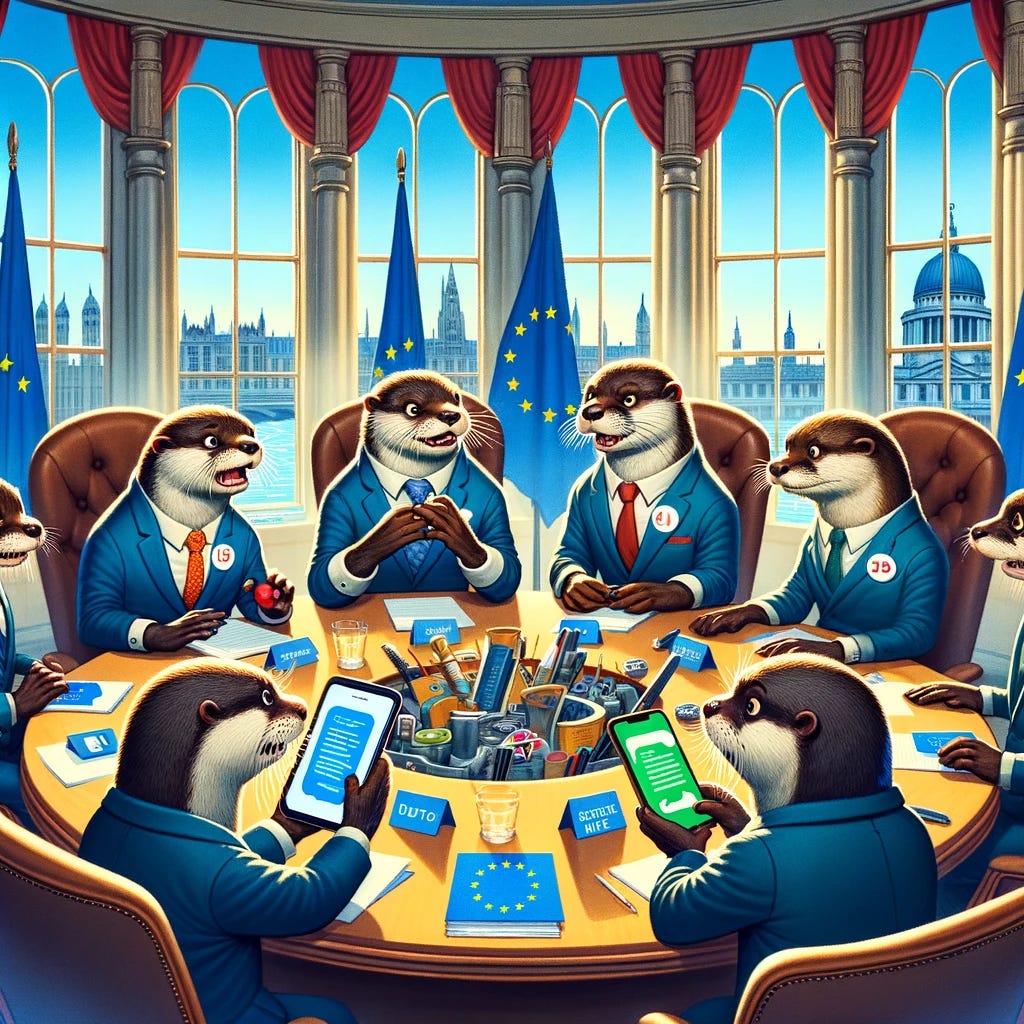Save The Blue Bubble!
Or why the EU Digital Markets Act will harm us all
The European Commission has launched an investigation into Apple's iMessage platform on competition grounds, with the service the latest target of Brussels’ crackdown on tech monopolies. The Android users among you - I will never relate - may be cheering that the EU is finally doing something about green bubble stigma. But bear with me, because far from empowering consumers and increasing competition, the EU's approach threatens to destroy it altogether – and will have effects far beyond the bloc.
The EU's Digital Markets Act is Becoming a Contradiction in Terms
The EU’s foray into regulating messaging forms part of its ongoing attempt to draft a “core services list” to be regulated under the Digital Markets Act. Set to come into force next March the DMA seeks to tackle “gatekeepers” - those big tech firms entrenched in the sector with a "strong intermediary position" connecting consumers with businesses and each other. The act is designed to ensure interoperability, data protection, and the fair ranking of products and services under the guise of increasing competition.
The argument in favour of this approach is that having as little friction as possible when switching, for instance, from a phone made by Apple to one made by Samsung, increases competition. Similarly, ensuring a more objective ranking of search results or the ranking of products on platforms like Google or Amazon is said to create a more level playing field. The problem is that focusing on interoperability fails to recognise that consumers weigh their product choices based on differences as well as similarities.
iMessage is the perfect example. iPhone users can choose from plenty of other messaging services, as a large degree of interoperability between operating systems already exists. Want to message a friend on a different platform? You can use WhatsApp, Facebook Messenger, or Signal, to name a few. However, many people choose to use iMessage because it's private and secure, and while Apple definitely uses its exclusivity to sell more hardware, it doesn't have the same incentives to profit off your data as Facebook or Google do. If you force interoperability, say through Google's RCS protocol, you make iMessage less private and thus diminish a large part of its unique selling point, diminishing competition.
The same is true of Apple's App Store and its enforcement of the Safari Webkit framework for all iOS web browsers. A significant part of the appeal of Apple's products is precisely the fact that Apple acts as a “gatekeeper”. People choose to buy Macs, iPhones, and iPads, etc., because they deliver a subjectively better user experience due to their lack of interoperability with Windows and Android devices.
I’m not entirely shilling for the fruit company here either, I’m firmly in Apple’s walled garden and some of the decisions they make really annoy me and there are plenty of good subjective reasons why one might wish to use a different platform. The European approach implies we can have the best of all worlds through interoperability and whilst this might be true to an extent, it’s also a paradox because it would mean the downsides of different products and services being pooled as well.
The disagreement between Alphabet/Google etc. and Apple is a prime example of competition - two firms offering different models with different trade offs and consumers choosing their preferred option with their wallets. I would be much more concerned about where some big tech firms appear to be clubbing together on AI regulation to lock out smaller competitors.
Google and Meta are encouraging the EU on the sidelines but the bloc is coming for them too. The EU’s upcoming data protection legislation threatens to undermine Meta’s entire business model. The outlook for tech firms on the continent is bleak unless something changes soon.
The EU Can't Risk Missing The Boat Again
The most telling part of the whole DMA saga is that none of the companies effected are European to begin with. It clearly hasn’t occurred to the bloc that the reason why there isn’t a German Google or a French Microsoft is precisely because of the regulatory model they’re doubling down on. Tech startups have long been stifled by the continent’s burdensome red tape.
Often, the same, or very similar regulations apply to small firms as large ones - think GDPR. Ironically, when bigger firms can afford to absorb the impact of ridiculous regulations it’s competition that pays the price when smaller firms fall by the wayside. The general approach is also highly flawed, often regulating on the basis of worst-case scenarios rather than reality. This is the dynamic playing out with the EU's attempts to regulate AI, where they are planning to restrict development based on the potential rather than the proposed use of a model.
For those in Europe, the current direction will make life worse, ensuring that the continent falls behind other major economies in the emerging technologies transforming our world – just as they have with previous waves of technology. For the rest of the world, this matters almost as much. On a case-by-case basis, what the EU does is either generalised to other markets – like with the forcing of a universal charging standard for phones – or results in the continent being cut off from products and services used in other countries.
Meta hasn't launched Threads in the EU yet, and many cutting-edge AI models are avoiding the bloc. For those who believe in the free flow of information and the notion that liberal democracies should be in harmony over these important issues, this bodes very badly indeed. The EU urgently needs a rethink.
If you’ve enjoyed this piece then please consider subscribing, it’s free and you have nothing to lose except a small portion of your life. If you’re already a subscriber then thank you! Please share this post with anyone who might be interested. You can find me on X/Twitter @Vibe_Magnate




